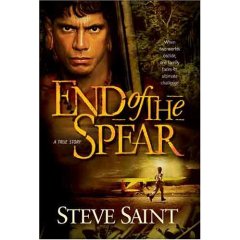 Book Reviews by Sondra Eklund
Book Reviews by Sondra Eklund
 Book Reviews by Sondra Eklund
Book Reviews by Sondra Eklund
|
Buy from Amazon.com
Rate this Book Sonderbooks 105 Previous Book Next Book Nonfiction Biographical Previous Book Next Book Fiction Young AdultFiction Children's Nonfiction Children's Fiction Picture Books 2005 Stand-outs 2004 Stand-outs 2003 Stand-outs 2002 Stand-outs 2001 Stand-outs Five-Star Books Four-Star Books Previous Book Next Book Old Favorites Back Issues List of Reviews by Title List of Reviews by Author Why Read? Children and Books Links For Book Lovers About Me Contact Me Subscribe Make a Donation I don't review books I don't like! *****= An all-time favorite |

****End of the Spearby Steve Saint Reviewed March 5, 2006.
Tyndale House Publishers, Available at Sembach Library (MCN 986.6 SAI). I haven’t yet
seen the movie
based on this book, and it’s hard to imagine that it could include as
much as
the book does. Steve Saint is the son of
Nate Saint, one of the five missionaries killed by the Waodani tribe
(known as
Aucas—“savage killers”) back in 1956. He
tells the story, not only of the Waodani and how they “learned to walk
God’s
trail,” but also how in modern times, they asked Steve and his family
to come live
with them and help them get along with the modern world. Also at his
aunt’s funeral,
Steve Saint found out more about his father’s death.
He learned that a man he loved as a second
father had been the one who did the spearing. He
shows the tremendous transformation in the lives of the
Waodani. They admit themselves that they
were doing so
much killing, they would soon have died out if they hadn’t learned
about God’s
way. It was nice
to read this book
after reading Confessions of an Economic Hit Man,
where the author accuses
the missionaries of exploiting the natives for the sakes of the oil
companies. It’s true that there’s a good
chance the oil companies would have killed or driven out the Waodani if
things
had continued as they were. But the
missionaries brought life and hope, not exploitation. In 1995,
Steve Saint and his
family moved to live among the Waodani. They
wanted help relating to the modern world full of
people who did
want to exploit them. The Waodani built an
airstrip and built their own light aircraft to be able to fly medical
missions. They learned how to do their
own medical care. Steve was careful to
have them build their own community buildings and such, so they would
not feel
they belonged to the missionaries. He
was interested in equipping them to be independent of him as their
culture had
to have more dealings with the rest of the world. Steve Saint
weaves in his
father’s story, the stories of the Waodani whom he loves, and what it
meant to
him to move back to the jungle. Especially
powerful is when he shows that his father’s
death—which of
course caused him great pain—ended up being used to bring thousands of
people
closer to God. This is a
powerful and
interesting story. Steve Saint’s love
for his Waodani brothers comes out on every page, and we can see how
much
wisdom they have of their own, even if they don’t know how to program a
computer. This book will move, inspire,
and challenge you. Copyright © 2006 Sondra Eklund. All
rights reserved. |